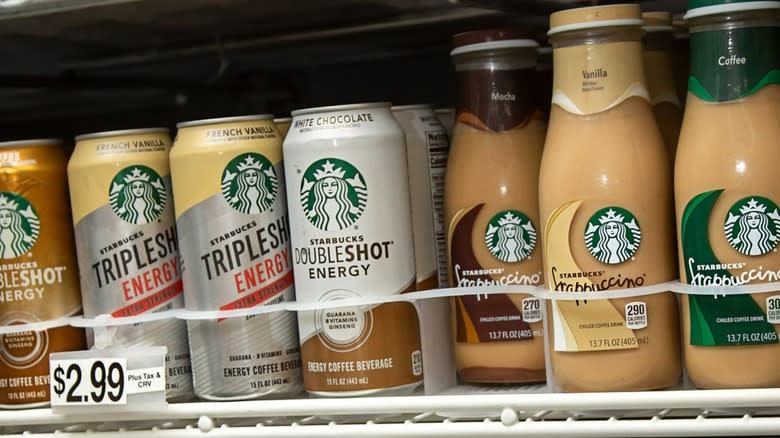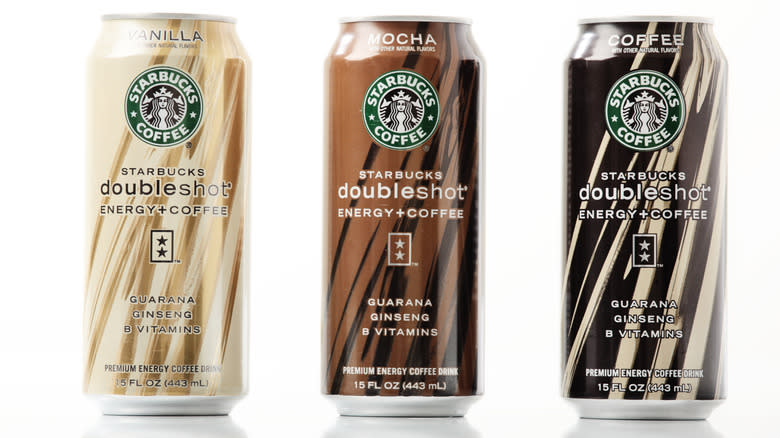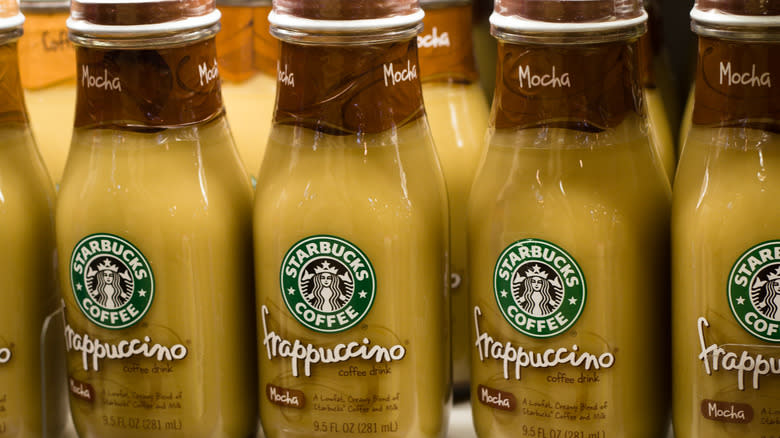Canned Vs Bottled Coffee: Container Aside, Is There Any Real Difference?

Many coffee manufacturers, Starbucks included, package their coffee in cans and bottles and sell them in stores. For avid coffee drinkers, this can be especially efficient, as they can buy their preferred brand's java in bulk rather than taking time to stop at a coffee shop every day. However, there is a downside –- coffee sold in these mediums often tastes different than the freshly brewed product you're used to.
To help manufacture better-tasting packaged coffee for Blue Bottle, the company's CEO James Freeman began to research why this might be. As The Atlantic reports, he quickly found that the method to keeping coffee shelf stable changes the taste of the drink in a major way. Alas, not all hope is lost, as Starbucks has whipped out some decently flavored canned and bottled coffees over the years. According to a study by Mashed, when Starbucks drinks are ranked from worst to best, the bottled Caramel Macchiato Iced Espresso earned first place, with the canned Starbucks Triple Shot Zero Sugar Milk Chocolate being the least favorable. That brings us to our main question –- what's the difference between canned and bottled coffee beverages? It seems that the answer lies in the taste.
Read more: How To Get More Flavor From Your Coffee Pods & Other Keurig Hacks
Canned Coffee

As you may have expected, the container in which coffee is housed can greatly affect the flavor of this caffeinated beverage. Some companies, such as Blue Bottle Coffee, use aluminum to produce their cans. Using aluminum has its benefits and downfalls; when it comes to other beverages such as soda, the lining used in aluminum cans soaks up some of the flavor, thus changing the way the beverage tastes. This could be why canned coffee always tastes weird.
According to Wired writer Ramona Emerson, canned coffee tastes like "Swiss Miss and metal," which may actually just come from your mouth making contact with the can as you sip. As Counter Culture Coffee owner Peter Giuliano further explains to Wired, "[canned coffee is] not crafted. [It's] manufactured." These metals are probably chosen for a reason, though, as they're strong enough to serve their purpose. If subtle metallic notes don't bother you, canned coffee certainly has its benefits. The coffee is usually fresh due to its vacuum sealing, and it's resistant to spoiling for about two years.
Bottled Coffee

When it comes to bottled coffee, glass is the most commonly used vessel. This material isn't just durable; it can also purportedly preserve a beverage's flavor and increase its shelf life due to its airtight sealing. Unlike aluminum cans, glass won't negatively affect your coffee's flavor. As a matter of fact, Sparrow Coffee owner Chris Chacko believes glass bottles enhance the taste of coffee. "Somehow, glass can even taste a little sweeter," he said to All Recipes.
Though unopened bottled coffee will last quite a while, bottles that have been opened should be immediately refrigerated and subsequently consumed within 12 hours. Furthermore, keeping your beverage in the refrigerator will boost its flavor. This is especially true of bottled iced coffee or Starbucks brand Frappuccinos, as they're designed to be enjoyed cold. Because bottled coffee comes with a lid, it can be easily shut for transport, while of course, opened canned beverages can't be saved for later.
Read the original article on Mashed.